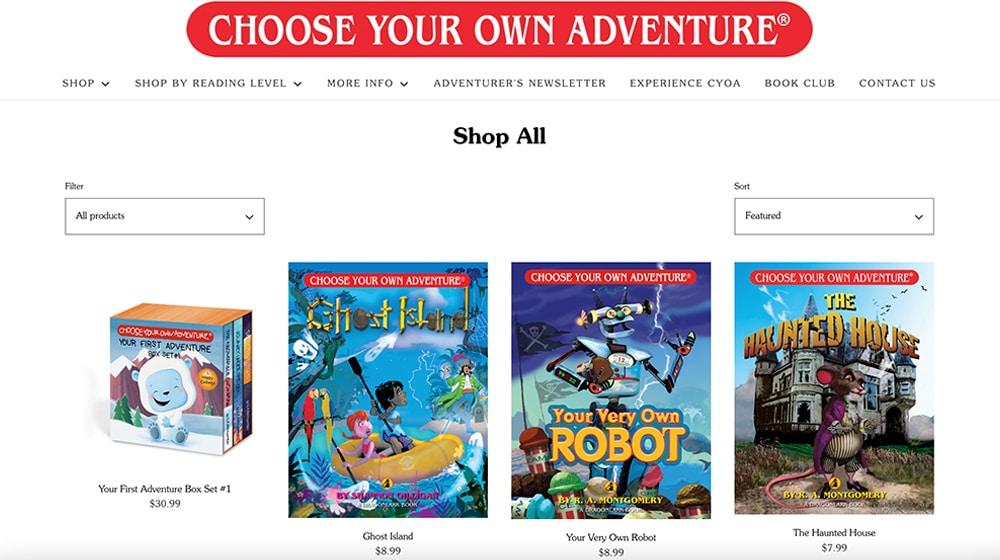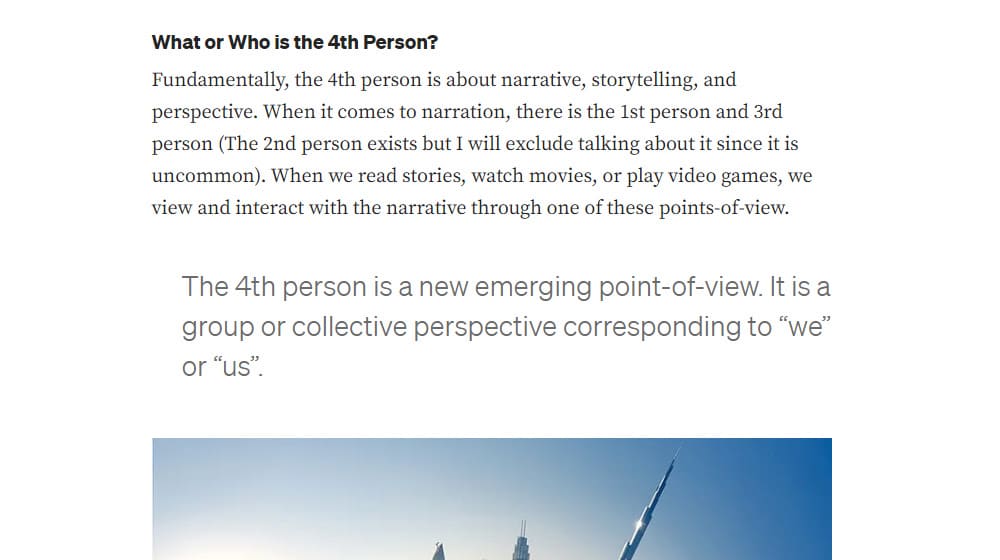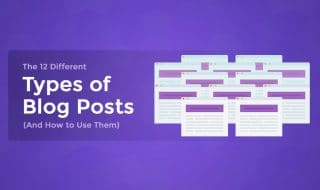Do First-Person Written Blog Posts Rank Better on Google?

Whenever you settle in to write a blog post, one of the first things you need to decide is what perspective and point of view you're going to take. You probably don't even consciously think about it; it's just part of the style you've developed over time. Then you may wonder, is your POV holding you back? Does Google prefer content written in one POV over another? It's a question with a surprising amount of depth, so let's dig in and see what we find.
 30 Second Summary
30 Second Summary
You can write from five different viewpoints: first-person ("I/we"), second-person ("you"), third-person limited or omniscient ("he/she/they") and fourth-person (collective perspective). While you don't need to worry about Google penalizing your choice of viewpoint, you should stay consistent within each post to show quality. You should pick a viewpoint that matches what your readers want - use first-person for personal stories, third-person for formal topics or second-person to connect directly with readers.
The Five Different Points of View
You've probably heard of first-person and third-person before. These are the two most common points of view in fiction writing, so they're the ones most commonly discussed. They're also the two modes that a camera in a video game (or other piece of visual media) can take. But did you know there are other POVs as well?
There are five in total.
1. First-Person
First-person point of view is writing or other media created from the point of view of the character in the scene. It uses pronouns like "I" and "We" to describe what's going on.
"I'm here today to talk about the point of view in writing, and what it means when we write in different points of view."
First-person POV is more immersive and personal. In a first-person video game, you have a personal view of what's going on; shooters and walking simulators are prime examples. First-person is rarely used in cinema, but when it is, it's used to good effect to limit the information and framing of a scene. In blogging, the first-person point of view is effective for bringing a personal touch to what you're writing. A food blog describing the time they went out to eat somewhere, had a delicious meal, and wanted to replicate it, or a travel blog talking about a specific trip they went on, are examples of a first-person form of blogging.

First-person blogging is, however, limited; when you're casually discussing personal experience, you lose out on some of the authority of being a brand or thought leader in certain spheres, particularly when data is more important than experience. If the CDC wrote their missives in first-person, even more people would distrust them than they already do.
2. Second-Person
Second-person viewpoints are interesting, because they seem unusual when you're thinking about them initially, but when you realize how they work, they're suddenly a lot more intuitive.
Second-person uses the pronoun "you" and varies in usage across different kinds of media. In movies, it only happens when a character in the film breaks the fourth wall and talks to you, the audience member, directly. The same goes for video games. In writing, it's addressing the reader, not as if someone is telling you a story, but as if the story is happening to you. The biggest example is the Choose Your Own Adventure series.

What about in blogging, though?
"You're wondering whether or not the perspective in a blog post matters. You seek out information about the subject, and it has led you here. What do you learn?"
I actually write all of my blog posts in a mixture of first- and second-person perspectives. I don't frequently step in with the personal pronouns, but I do commonly address you, the reader. Just check out the intro to this very post! However, I consider it to be first-person writing because it's framed as me addressing you rather than you experiencing all of this research for yourself.
3. Third-Person
While I said there are five different points of view, that's a point of contention. Some people consider there to be only four because two of them are variations of third-person perspective. The two versions are Limited and Omniscient.
Third-person, in general, uses pronouns like He, She, They, and It in narration. In storytelling, this is the most common form of writing because it allows an author to explore a scene without being restricted to the point of view of a particular character's vision quite as much. Most movies are shot in the third person, and video games with a third-person camera show the characters and action from a camera that isn't tied to the eyes of a character.
"Bloggers in general often need to decide what kind of perspective to use in their blogs. Do they pick first-person, second-person, or third-person? Are there other options?"
So, what's the difference between the different kinds of third-person perspective?

Limited third-person follows one person and their thoughts but doesn't get a glimpse into the thoughts of other people in a scene. The main character has an inner world to explore; other characters are exactly as much of an enigma as anyone is in real life for anyone who isn't psychic.
Omniscient third-person follows a scene and is willing and able to get glimpses into the thoughts and feelings of different characters. "Dave felt pleased with himself over the pun he told; Jenna, though, was infuriated." It's the "God" perspective that can see inside the heads of everyone in a scene to present it objectively.
There's technically a third form of third-person, which is Objective third-person. This is really just an even more limited version of limited, where even the POV character doesn't get their thoughts and feelings aired to the audience.
In terms of blogging, you're either dealing with limited or objective third-person since you can't really narrate what your audience is thinking. In fiction, it's the opposite.
4. Fourth-Person
Fourth-person POV is an odd one. For decades, centuries even, common knowledge has been that there are only three POVs. Even amongst those who recognize a fourth-person POV, the exact definitions vary. Usually, though, it's an interesting hybrid of first-person and third-person, a sort of first-person omniscient, collective format. Rather than being told from an objective viewpoint, it's told from something more closely aligned to a personal perspective; however, rather than being an individual, it's a collective. Narrating a scene from the perspective of an entire town or a social group rather than an individual participant in that group. "The collective subjective" is how it's commonly described.

If I were to write a blog post but, instead of using I to represent myself, I used "we" to represent bloggers in general – but presented my writing as agreed-upon fact rather than assumption or subjective opinion of an individual member of that collective – it would technically be fourth-person writing. Realistically, it's more likely to be considered first-person outside of specific circumstances.
So, now that you have a good idea of what the different points of view are, let's get into the meat of the issue: is one of the better than the others, and does Google have a preference?
We create blog content that converts - not just for ourselves, but for our clients, too.
We pick blog topics like hedge funds pick stocks. Then, we create articles that are 10x better to earn the top spot.
Content marketing has two ingredients - content and marketing. We've earned our black belts in both.
5. Fifth-Person and Beyond
Is there a fifth-person POV? A sixth?
Not really. It's possible that, over time, classifications can change and new ideas can be developed, the way the fourth-person perspective has developed, but there are only so many ways that there can be a narrator present in a scene, and further breaking them down doesn't serve much purpose.
It's an interesting thought experiment, but not really relevant.
Does Google Care?
First, the biggest and most impactful question: does Google care at all?
The simple answer is absolutely not. Google doesn't care what pronouns you're using or what perspective you're using throughout your blog posts. In fact, the way Google indexes posts using things like the TF*IDF Algorithm generally discounts pronouns and other filler words entirely. Functionally, they practically don't even exist as far as Google is concerned.

But… is that really true?
Certainly, Google isn't going to penalize you for writing in first-person versus third-person.
What they might do, though, is penalize you (very, very lightly) for inconsistencies in POV.
Inconsistency in point of view, depending on where and how it happens, can indicate a few things. If you change POV throughout a single blog post, it can be a sign that there's not much attention or editing being paid to the content you're producing.
- Maybe you're ESL and don't have a firm grasp of how points of view work.
- Maybe you're just banging out a post chunk by chunk at different times, so they don't have a coherent through-line.
- Maybe you're mindlessly copy-pasting chunks of posts from other sources in a form of content theft and making no attempt to hide it.
- Maybe you're using a content AI and it isn't consistent, and you don't care enough to fix it.
All of these aren't huge problems in and of themselves (except the content theft, of course), but they do indicate that you have a critical lack of attention being paid to your content, and that doesn't bode well for things like fact-checking, authoritativeness, trustworthiness, and other signs of value and worth.
Conversely, if each individual post is consistent throughout, but different posts on your site have different POVs, it can indicate:
- You have multiple authors writing for your blog, and they all have different POVs.
- You have ghostwriters writing for you, and you don't have a consistent style guide for them to follow.
- You wrote in one POV at one point in time but changed it and didn't go back and update old posts.
All of these are pretty much fine. Google isn't going to penalize you for using ghostwriters, or for having multiple authors, or for changing your style over time.
Does Your Audience Care?
Now for the second part of the discussion. Does your audience care what point of view you're using?
Consciously, probably not. Very few people actually pay much attention to the point of view of the writing they read. They might notice when it's out of the ordinary – which is why fourth-wall breaking is effective in media – but normally, they aren't watching it.
Point of view does affect the feel of content, though. This means you need to tailor your point of view to the audience you're writing to.
Up above, I used the example of food and travel bloggers for a personal first-person point of view. These are industries that value personal experience. They thrive on demonstrating a lifestyle, either in a "live vicariously through me" kind of way or through a "you can do this too, just do what I do" kind of way.
On the other hand, the CDC example is the inverse. When you want to present a united, authoritative, objective, and factual perspective, you don't use an individual point of view, you use a higher-level, more omniscient point of view. Case studies, white papers, data presentations, none of these use the first person.

There was a time, many years ago, when most blogging was done in a third-person point of view, as stuffy and formal as possible. The idea was that a company should be a firm, trustworthy authority figure in their industry, above the petty concerns of individualism. "Personal blogs" were deemed second-string or less valuable because they were "just" the perspective of one person, and people can be wrong.
You don't resonate with that kind of content, though. More and more businesses started shifting to more personal perspectives to better connect with their audience, form emotional connections, resonate with them, and entice them to explore products and make purchases. "The company is your friend" taken to an extreme.
These days, it's hard to find a brand that doesn't write from a more casual perspective, and there are incentives to do so, like building a personal brand distinct from your business or building thought leadership as an individual.
Mostly, these don't matter for ranking. The only way it matters is secondary impacts; when more of your audience resonates with your content, more people share it, more people see it, more people come back for more. Better user engagement has a knock-on effect across other forms of SEO, which can boost your site in general.
Pick what works, not what you think Google wants.



 30 Second Summary
30 Second Summary


Comments